
Haworthia is a large genus of small succulent plants endemic to Southern Africa (Mozambique, Namibia, Lesotho, Eswatini and South Africa).

Haworthia cymbiformis is a species of the genus Haworthia in the family Asphodelaceae, endemic to the Eastern Cape Province in South Africa.
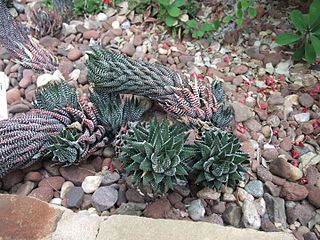
Haworthiopsis reinwardtii, formerly Haworthia reinwardtii, is a species of succulent flowering plant in the family Asphodelaceae, native to the Eastern Cape Province of South Africa. It is one of the species of Haworthiopsis that is commonly cultivated as an ornamental.

Haworthiopsis limifolia, formerly Haworthia limifolia, is a species of flowering plant in the genus Haworthiopsis, native to southern Africa and first described in 1910.

Haworthia truncata, locally known as horse's teeth, is a species of succulent plant in the genus Haworthia. It is found in the Little Karoo region, in the far east of the Western Cape Province, South Africa.

Haworthia magnifica is a species of the genus Haworthia belonging to the family Asphodelaceae.

Haworthia mirabilis is a species of the genus Haworthia belonging to the family Asphodelaceae.

Haworthia bolusii is a species of Haworthia that was originally described by John Gilbert Baker in 1880.

Haworthia angustifolia is a species of Haworthia from the eastern Cape Province. It is an evergreen succulent plant with short leaves arranged in rosettes of 8 cm in diameter. The leaves, about 20, are upright, acuminate and lanceolate, 3–6 cm long and 6–12 mm wide.

Tulista is a small genus of succulent plants endemic to South Africa. They were formerly included within the genus Haworthia.

Haworthia pygmaea is a species of the genus Haworthia in the family Asphodelaceae, endemic to the Mossel Bay area of the Western Cape, South Africa.

Haworthiopsis pungens, formerly Haworthia pungens, is a species of flowering succulent plant from the Eastern Cape Province, South Africa.
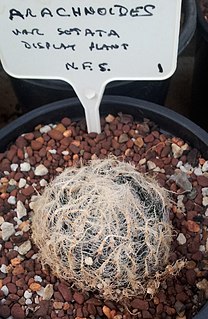
Haworthia arachnoidea, locally known as "papierrosie" (paper-rose) or "spinnekopnes" (spider-nest), is the type species of the genus Haworthia, in the family Asphodelaceae, in the Western Cape Province of South Africa.

Tulista minima is a species of succulent plant, from the far south of the Western Cape, South Africa.
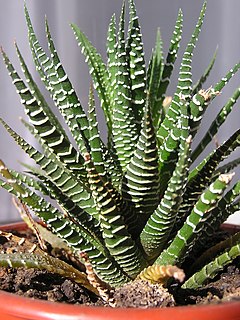
Haworthiopsis is a genus of succulent plants in the subfamily Asphodeloideae. The genus was previously included in Haworthia. Species in the genus are typically short perennial plants, with leaves often arranged in a rosette and frequently having raised white markings. The two-lipped flowers are borne on a tall stalk and are small – less than 17 mm (0.7 in) long – and pale in colour. Many species are cultivated as house plants or by succulent enthusiasts.
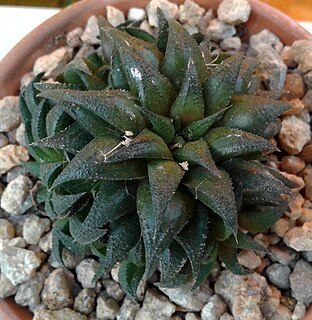
Haworthia parksiana is a species of succulent plant native to the Cape Province of South Africa. Regarded as the smallest and one of the rarest types of Haworthia in the wild, it is thought to be most closely related to Haworthia floribunda. It grows in rosettes that offset, and is often hidden in the ground.

Haworthia mutica is a species of succulent plant native to South Africa's Cape Province. Very similar to, and often confused with, types such as Haworthia retusa, the species has blunt, triangular shaped leaves that are typically striated. In the wild it rarely offsets, though clones in cultivation may do so readily. The variety H. mutica var nigra is similar but with darker leaf color.

Haworthia chloracantha is a species of succulent plant native to the Cape Province of South Africa. H. chloracantha has typically pale yellow-green leaves and is somewhat similar to Haworthia reticulata in form, but the leaves are opaque rather than translucent. It forms prolific clusters of plants. The plant has a few subvarieties including var. denticulifera, meaning has small teeth on its leaves, and var. subglauca, which has darker foliage.

Haworthia floribunda is a species of succulent plant in the genus Haworthia native to the Cape Province of South Africa. It grows in rosettes with dark green, lanceolate leaves that curve or twist outward. The leaves may be smooth or, in H. floribunda var dentata, have small teeth.
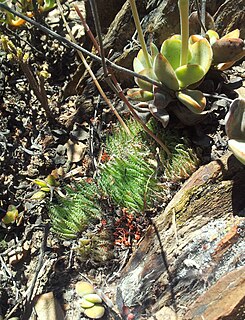
Haworthia herbacea is a species of succulent plant in the genus Haworthia native to the Cape Province of South Africa. Closely related to Haworthia reticulata, it has greenish yellow leaves with small spines. As it matures the leaves get darker green and the white spots raise. Flowers by way of a shoot and produces a large off-white flower.




















